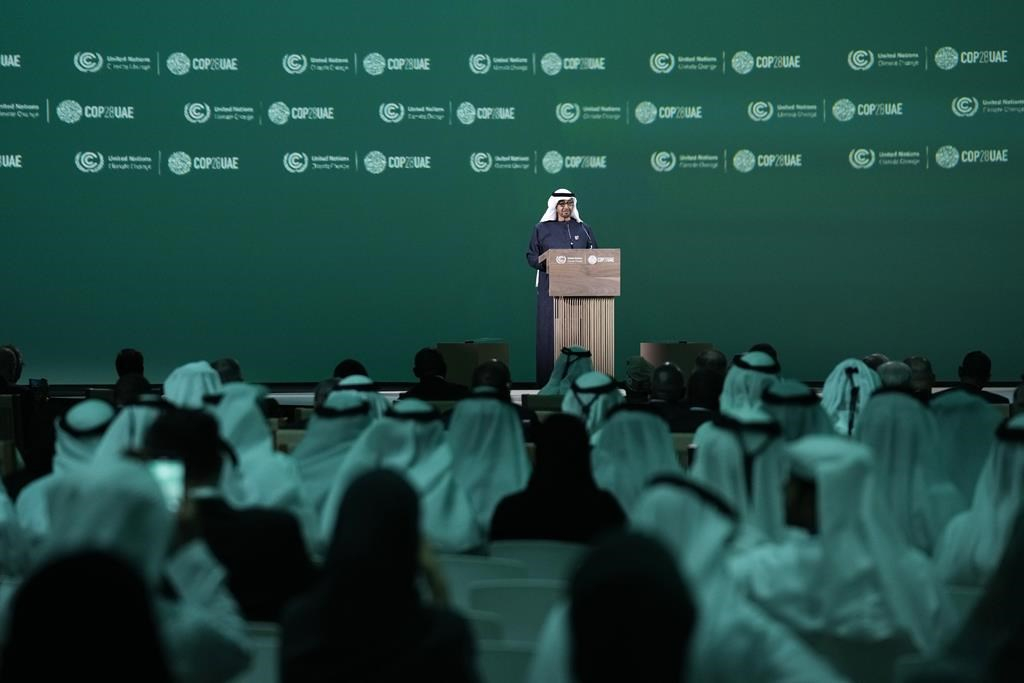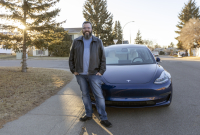Support strong Canadian climate journalism for 2025
International climate talks turned to a power game on Friday as dozens of world leaders including the Saudi crown prince and India's prime minister were to speak, but two of the world's most powerful men — President Joe Biden of the U.S. and China's President Xi Jinping — were glaringly absent.
Crown Prince Mohammed Bin Salman of Saudi Arabia, a top oil producer, and Prime Minister Narendra Modi of India, whose biggest cities are regularly choked under poor air, as well as Presidents Emmanuel Macron of France, Cyril Ramaphosa of South Africa, Abdel Fattah el-Sissi of Egypt and Recep Tayyip Erdogan of Turkey were among more than 130 world leaders set to address the United Nations climate conference in Dubai over the next two days. The idea is to try to keep the planet from heating too much because of humankind's actions.
In a fire-and-brimstone kicking off of Friday's parade of VIPs, U.N. Secretary-General Antonio Guterres, fresh from melting glaciers in Antarctica and Nepal said "Earth's vital signs are failing" and told leaders, “you can prevent planetary crash and burn.”
He referred to inequality and conflicts, mentioning the return of bombing in Gaza Friday.
“Climate chaos is fanning the flames of injustice,” Guterres said. “Global heating is busting budgets, ballooning food prices, upending energy markets, and feeding a cost-of-living crisis. Climate action can flip the switch.”
Guterres, a long-time critic of oil, gas and coal use that is causing climate change, fired his strongest shots yet against the industry, which includes host country United Arab Emirates, saying, “we cannot save a burning planet with a firehose of fossil fuels.”
In a direct contradiction to fossil fuel-aligned nations and even the presidency of the talks, he said the only way to limit warming to the goal set in 2015 requires eliminating oil, coal and gas use, saying “not reduce, not abate, phase out.”
Britain's King Charles III warned of “a starker and darker world” unless leaders change course.
“The hope of the world rests on the decisions you must take,” he told leaders, urging them “to meet it with ambition, imagination, and a true sense of the emergency we face.”
“The Earth does not belong to us, we belong to the Earth,” Charles said.
Luiz Inacio Lula da Silva of Brazil, home to most of the world’s biggest natural carbon-capture zone on land, the Amazon rainforest, said “the planet is tired of climate agreements that were not fulfilled” and he said he has had enough of “eloquent and empty speeches.”
“In the north of Brazil, the Amazon region suffers one of the most tragic droughts of its history. In the South, we are facing tempests and hurricanes that lead to a lot of destruction and death,” he said.
Lula, who a year earlier was treated like a rock star after his defeat of right-wing Jair Bolsanaro, called for climate justice for poorer nations that didn’t cause the problem and railed against $2 trillion spent on weapons last year when the money should be spent on fighting hunger and climate change, not wars.
He said Brazil will stop Amazon deforestation by 2030.
But the leaders of the two biggest carbon-polluting nations — responsible for more than 44% of the world's emissions — aren't there to get the in-person message.
Xi and Biden are sitting out this COP, just weeks after announcing a bilateral agreement to help cut down on methane emissions. Their deputies, U.S. Vice President Kamala Harris and China's First Vice Premier Ding Xuexiang, will be attending instead.
Many of the leaders speaking represent countries hard hit by floods, storms, drought and heat waves worsened by climate change from the burning of coal, oil and gas. Those include the islands nations of Palau and the Maldives as well as leaders of Pakistan and Libya, which have been devastated by recent floods that killed thousands.
Against the backdrop of tensions pitting his country against Hamas militants in Gaza, President Isaac Herzog of Israel — whose post is more ceremonial — will be rubbing elbows with some of the biggest power players in the Middle East.
On Thursday, just moments after the opening of the two-week COP28 climate conference in the oil-rich United Arab Emirates, nations rallied together to formally create a “loss and damage” fund that will help compensate countries — especially developing ones — for the impacts of floods, droughts and heat waves.
Associated Press climate and environmental coverage receives support from several private foundations. See more about AP’s climate initiative here. The AP is solely responsible for all content.




Comments